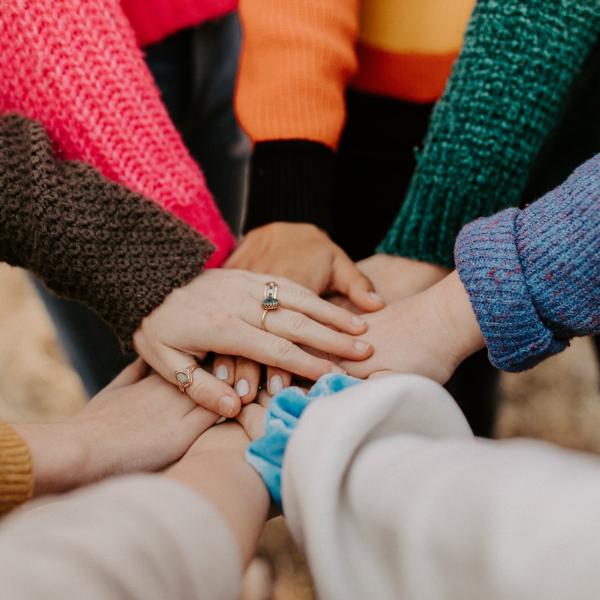Group counseling provides students an opportunity to be part of a small group (6-8 students) who meet regularly over the course of one academic term to share concerns, explore personal issues, and learn new skills under the guidance of one or two group leaders/facilitators. Each term, we offer a variety of therapy groups, including specific groups for depression, anxiety, trauma, LGBTQ+ students, and graduate students. Group therapy participants are asked to commit to attending group therapy sessions regularly for the duration of the group.
Confidentiality
As with all UCC services, group counseling sessions are confidential. Every group participant makes a personal pledge to not share anything discussed during group sessions or any information about other group members to anyone outside of group. Adherence to the rules of confidentiality by all group members is critical to establishing a safe and trusting group therapy atmosphere in which all members feel safe and comfortable sharing their feelings and concerns.
Join a Group
Please see below to learn more about groups that are regularly offered at the UCC. If you are interested in Group Counseling at the UCC, please utilize our Drop-In Services by visiting or calling the UCC at 412-648-7930, Monday-Friday from 9:00am - 4:00pm. Virtual options are available.
- Anxiety Support
-
Stressed out, racing thoughts, socially anxious? These groups provide skills focused on managing the physiological symptoms of anxiety, challenging anxious thoughts, and coping with anxiety.
- Coping With Grief
-
Coping with Grief is a weekly space where students can gather for connection with other students who “get it,” in the aftermath of a loss. The goal is to provide a space where students can feel safe to explore and process the emotions associated with losing someone important in their lives. Support is encouraged to go both ways in this space – both receiving and providing – for the overall benefit of all students who participate.
- Emotion Management
-
This group will provide students with skills for managing their emotions. Students struggling with anger, frustration, episodic depression, anxiety/irritability, stress and feelings of emptiness would benefit from this group. The group will be a combination of skills building and discussing how those skills have been effective towards their emotion regulation. Three categories of skills will be taught:
· Mindfulness: designed to teach a student how to focus their mind and attention.
· Distress tolerance: centered on accepting the current situation and finding ways to survive and tolerate the moment without engaging in problematic behaviors
· Emotion regulation: learning to identify and label current emotions, identifying obstacles to changing emotions, reducing emotional reactivity, increasing positive emotions, and changing emotions.
· Interpersonal effectiveness: helps us build and maintain healthy relationships, handle conflict, ask for what we need, and say no—while respecting ourselves and others.
- Empowering Survivors: Sexual Assault Support Group
-
This group offers a safe space for female-identifying undergraduate & graduate students who are survivors of sexual trauma to process its impact on their lives. Focus includes providing support, information on processing trauma, and exploring coping strategies for regaining trust, self-worth, and other challenges together.
- Executive Skills Group
-
Executive Skills Group is a group designed for students with diagnosed ADHD and/or struggling in any of the 11 executive skill domains: task initiation, prioritization, time-management, response inhibition, emotional control, flexibility, goal-directed persistence, sustained attention, organization, working memory and metacognition. This group is psychoeducational and skill building.
- Graduate Student Support
-
The Graduate Student Support Group is a space for students to share and discuss the unique challenges that graduate students encounter, both in master's and doctoral level programs.
- Making Friends With Yourself
-
The Making Friends with Yourself group is based on the mindful self-compassion program and will teach students how to become their best ally and be able to treat themselves as they might naturally treat others who go through the usual ups and downs of life. The group will focus on building and maintaining self-confidence, increasing internal resilience, addressing self-criticism, self-sabotage, and self-hate, identifying obstacles to supporting oneself, becoming more mindful of emotions and needs, decreasing procrastination, and learning how to motivate oneself.
- Nature RX for Anxiety
-
This group integrates DBT, ACT, Attention Restoration Theory, and Positive Psychology to support students in navigating anxiety and emotional distress through nature-based practices. Participants will engage in mindfulness, grounding, distress tolerance, and interpersonal effectiveness skills, using nature as a therapeutic tool to build resilience. Each session blends psychoeducation, experiential learning, and group reflection, offering a supportive space for growth. By the end, students will leave with a personalized nature-based wellness plan to sustain long-term well-being and acceptance of distressing thoughts and emotions.
- Trauma Psychoeducation
-
The Trauma Psychoeducation Group is a space for students with recurring traumatic experiences to learn, connect, and get support from their peers. This group aims to help students better understand the impact of trauma on the brain, body, and external environment, while also providing practical tools to manage emotions, reengage with or rebuild social supports, and reconnect with their values. This group is both educational and experiential in nature, equipping students with valuable information and tangible practices to improve their daily lives despite their traumatic experiences.
